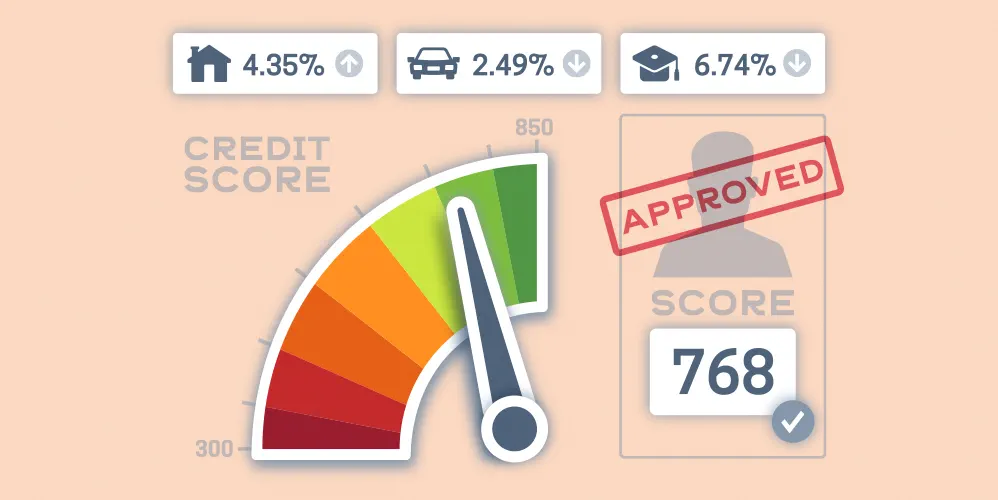
Understanding Personal Loan Part Prepayment and Closure
30 Aug 2023

Table of Content
Personal loans are unsecured loans offered by banks and financial institutions to meet the financial needs of individuals. These loans may be used for buying a vehicle or a home, paying off a debt or funding an emergency; the list goes on. Personal loans are easy to obtain and come with a flexible repayment tenor. Nonetheless, these loans are often extended at high-interest rates and rigid terms and conditions. At times, a borrower may be instances where a borrower may want to close the loan before the due date. There are standard procedures for this, which can vary from one lender to another.
Two main options for closing a personal loan are regular closure and pre-closure. This article discusses how to close a personal loan and the procedures involved in winding up a loan. It also discusses part pre-payment of the loan and; addresses some frequently asked questions (FAQs) related to closing a personal loan.
What are the ways of Closing a Personal Loan?
When choosing a way to close a personal loan, it's essential to consider the charges, penalties, and benefits involved. Before making a decision, it's best to discuss the options with the lender and understand the terms and conditions of the loan agreement.
Here are the ways to close a personal loan:
Regular Closure: Regular closure is when the borrower repays the loan as per the original loan agreement. The loan is closed when a borrower pays off all the EMIs and their interest as per the loan agreement.
Pre-Closure: Pre-closure or pre-payment is when the borrower decides to repay the loan before the due date. Such repayment allows borrowers to save on the interest they would otherwise pay on a loan. Pre-closure is a good option for borrowers who have a surplus of funds and want to close their loan earlier. However, the pre-closure is not an option for all personal loans and may come with charges or penalties.
Part Prepayment: The part prepayment is a partial pre-closure of the loan. It means the borrower can repay a portion of the loan principal without completely closing the loan. Part payment can help reduce the loan's tenure and interest payable but may also attract prepayment charges.
What is the Regular Closure of a Personal Loan?
The procedure for the regular closure of a personal loan is straightforward; the borrowers must repay the funds as per schedule to pay off the loan. Subsequently, the bank issues a closure letter confirming the loan repayment and that the borrower is no longer liable to make further payments.
Also Read - How to Pay Off Your Personal Loan Quickly?
What is the Pre-Closure of a Personal Loan?
The procedure for the pre-closure of a personal loan is a little more complex than regular closure. Borrowers need to inform the bank about their intention to pre-close the loan. After receiving the request, the bank will calculate the outstanding loan amount, interest, and pre-closure charges. The pre-closure charges are the charges that are levied by the bank for pre-closing the loan.
Once the bank has calculated the outstanding amount, the borrower repays the stipulated amount to close the loan. Subsequently, the bank issues a closure letter confirming the loan repayment and that the borrower is no longer liable to make further payments.
The procedure for pre-closure varies from institution to institution, but typically involves the following steps:
- Contact the financial institution to let them know you would like to pre-close your loan.
- Request a statement of account that shows the outstanding balance, interest charged, and any other charges that may be applicable.
- Make a payment for the outstanding balance plus any pre-closure charges that may be applicable.
- Wait for the financial institution to process the payment and issue a closure certificate.
What are Pre-payment Charges?
Often debtors like to repay their loans to avoid the burden of EMIs and interest costs ahead of the due date. While loan pre-payment or foreclosure may be favourable for borrowers, usually, pre-payment charges are involved. Suppose the borrower has availed of a personal loan at fixed interest rates. In that case, there may be charges of up to 5% on the unpaid principal amount, among other restrictions. In the case of a floating interest rate, however, the RBI has forbidden the creditors to levy a penalty.
Pre-payment is an appealing option in most cases, but you must weigh your pros and cons before exercising the option.
What is Part Prepayment of the Loan?
Part prepayment of the loan refers to repaying a part of the loan amount before the due date. Part prepayment is different from pre-closure as in part prepayment, the borrower continues to pay the remaining loan amount as per the scheduled payments. However, part prepayment can help reduce the total interest payable on the loan and also reduce the loan tenure.
In conclusion, closing a personal loan can be done through regular closure or pre-closure. Regular loan closure of a personal loan occurs when the borrower has fully repaid the loan amount and all the associated interest charges over the loan tenor. On the other hand, pre-closure of a personal loan occurs when a borrower decides to repay the loan before the due date. Part prepayment of the loan refers to repaying a part of the loan amount before the due date.
FAQs on Personal Loan Closure
Why is it necessary to close a personal loan?
It is not necessary to close a personal loan. Still, it may be beneficial for the borrower if they want to become debt-free quickly or want to reduce the total interest payable on the loan.
Does closing a personal loan increase credit score?
Closing a personal loan can impact your credit score in different ways. An open personal loan negatively affects your credit utilization rate and your credit mix, which can lead to a decrease in your credit score. However, it helps if you consistently pay off your loan. Closing such an account will show that you have a track record of responsibly paying off debt, which can increase your credit score.
How long does it take for loan closure to reflect in CIBIL?
Credit Institutions submit data to CIBIL every 30-45 days. Wait for at least 45 days after repayment of your personal for the data to reflect on your CIBIL report.
Can a person close a personal loan through online banking?
Yes, many banks provide online banking services to close a personal loan. You can log in to your online banking account, access the personal loan account, and follow the steps to wind it up. Before you close your loan, check the pre-closure charges and any other charges that may apply. Also, get a receipt or confirmation of the closure from the bank.
Popular Articles
Guide to Getting Agriculture Loan: Application, Eligibility & Required Documents
Tag Clouds
Related Articles









Guide to Getting Agriculture Loan: Application, Eligibility & Required Documents

-
Disclaimer
The contents of this article/infographic/picture/video are meant solely for information purposes and do not necessarily reflect the views of Bank of Baroda. The contents are generic in nature and for informational purposes only. It is not a substitute for specific advice in your own circumstances. Bank of Baroda and/ or its Affiliates and its subsidiaries make no representation as to the accuracy; completeness or reliability of any information contained herein or otherwise provided and hereby disclaim any liability with regard to the same. The information is subject to updation, completion, revision, verification and amendment and the same may change materially. The information is not intended for distribution or use by any person in any jurisdiction where such distribution or use would be contrary to law or regulation or would subject Bank of Baroda or its affiliates to any licensing or registration requirements. Bank of Baroda shall not be responsible for any direct/indirect loss or liability incurred by the reader for taking any financial decisions based on the contents and information mentioned. Please consult your financial advisor before making any financial decision.
How to Reduce Your Student Loan Debt
If individuals find themselves overwhelmed by the weight of their student loan debt and actively seek effective ways to reduce it, they need not look any further. This informative blog is dedicated to uncovering the secrets that can help them reduce student loan debt and regain financial freedom.
How to Get a Loan to Buy Agricultural Land
Agriculture has been the backbone of India's economy for centuries, and the country's farmers play a crucial role in feeding the nation. If you have a passion for farming and aspire to own agricultural land in India, but lack the necessary funds, there's good news for you. With the availability of agricultural loans, you can now empower your farming dreams and acquire the land you need to turn your vision into reality. In this blog, we will explore the various aspects of agricultural loans in India and how they can support your farming endeavors. Loan to buy agriculture land is one of the best value propositions available for prospect farmers in India.

